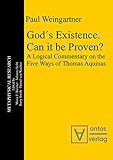God's existence, can it be proven? : a logical commentary on the five ways of Thomas Aquinas / Paul Weingartner.
Material type: TextSeries: Metaphysical research ; Bd. 10.Publication details: Frankfurt : Ontos Verlag, 2010.Description: 1 online resource (116 pages)Content type:
TextSeries: Metaphysical research ; Bd. 10.Publication details: Frankfurt : Ontos Verlag, 2010.Description: 1 online resource (116 pages)Content type: - 9783110324624
- 3110324628
- 3868380752
- 9783868380750
- 3110324385
- 9783110324389
- 212/.1 23
- BT103 .W45 2010eb
- online - EBSCO
- CE 4715
| Item type | Current library | Call number | URL | Status | Notes | Barcode | |
|---|---|---|---|---|---|---|---|
 eBook
eBook
|
Biblioteca "Angelicum" Pont. Univ. S.Tommaso d'Aquino Nuvola online | online - EBSCO (Browse shelf(Opens below)) | Online access | Not for loan (Accesso limitato) | Accesso per gli utenti autorizzati / Access for authorized users | (ebsco)603576 |
Browsing Biblioteca "Angelicum" Pont. Univ. S.Tommaso d'Aquino shelves, Shelving location: Nuvola online Close shelf browser (Hides shelf browser)

|

|

|

|

|

|

|
||
| online - EBSCO Early Latin theology / | online - EBSCO Entire sanctification / | online - EBSCO From an Existential Vacuum to a Tragic Optimism : the Search for Meaning and Presence of God in Modern Literature. | online - EBSCO God's existence, can it be proven? : a logical commentary on the five ways of Thomas Aquinas / | online - EBSCO Introduction to Christian theology / | online - EBSCO Luke / | online - EBSCO The A to Z of Sacred Music. |
Includes bibliographical references and index.
1. The Five Ways: Preliminary Questions; 1.1 Whether the Existence of God is Self-Evident?; 1.1.1 Text: Thomas Aquinas' Answer; 1.1.2 Commentary on the Answer; 1.1.2.1 Definition of Self-Evident Proposition; 1.1.2.2 Is God Exists Self-Evident to Us?; 1.1.3 Commentary to the Objections; 1.1.3.1 Is the Knowledge of God Naturally Implanted in All?; 1.1.3.2 Is the Existence of Primal Truth Self-Evident?; 1.1.3.3 Thomas Aquinas ́ Commentary on the Ontological Argument; 1.2 Whether it Can Be Demonstrated that God Exists?; 1.2.1 Text: Thomas Aquinas' Answer; 1.2.2 Commentary on the Answer.
1.2.2.1 Two Types of Demonstration1.2.2.2 The Cause as Necessary Condition for the Effects; 1.2.2.3 From God's Effects to His Existence; 1.2.2.4 Is it Necessary to Assume a Cause for the World (Universe) which is Outside the World (Universe)?; 1.2.3 Commentary on the Objections; 1.2.3.1 Is the Existence of God an Article of Faith?; 1.2.3.2 Does One Need a Definition of God for Understanding His Existence?; 1.2.3.3 Are God's Effects Proportional for a Demonstration of His Existence?; 2. The Five Ways; 2.1 The First Way; 2.1.1 The Latin Text and its Translation into English.
2.1.2 The Premises and Conclusions of the Text2.1.3 Reconstruction; 2.1.4 Commentary; 2.1.4.1 A Problem with Premise 6; 2.1.4.2 Different Meanings of Movetur -- 2.1.4.3 Definition of the First Mover; 2.2 The Second Way; 2.2.1 The Latin Text and its Translation into English; 2.2.2 The Premises and Conclusions of the Text; 2.2.3 Reconstruction; 2.2.4 Commentary; 2.2.4.1 Irreflexivity of the Causal Relation; 2.2.4.2 Cause as a Necessary Condition; 2.2.4.3 Transitivity; 2.2.4.4 Definition of the First Cause; 2.2.4.5 Infinite Regress; 2.3 The Third Way.
2.3.1 The Latin Text and its Translation into English2.3.2 The premises and conclusions of the text; 2.3.3. Reconstruction; 2.3.4 Commentary; 2.3.4.1 The Concept of Necessity Used in the Third Way; 2.3.4.2 The Concept of Necessity in Relation to Time; 2.3.4.3 Aristotle's view according to Thomas Aquinas; 2.3.4.4 Thomas Aquina ́s Premises and Conclusions in the Third Way; 2.4 The Fourth Way; 2.4.1 The Latin Text and its Translation into English; 2.4.2 The Premises and Conclusions of the Text; 2.4.3 Reconstruction; 2.4.4 Commentary; 2.4.4.1 Premise 2.
2.4.4.2 The Definition which Connects Perfection with Being (Premise 5. of 2.4.3)2.4.4.3 The Most Perfect Thing is the Cause of All Perfection; 2.5 The Fifth Way; 2.5.1 The Latin Text and its Translation into English; 2.5.2 The Premises and Conclusions of the Text; 2.5.3 Reconstruction; 2.5.4 Commentary; 2.5.4.1 Natural Beings Lacking Intelligence; 2.5.4.2 The Question of the Validity of the Argument; 2.6 The Question of the Uniqueness in the Conclusions of the Five Ways; 2.6.1 First Question; 2.6.2 Second Question; 2.7 Commentary to the Objections; References.
The aim of the book is to show that the Five Ways of Thomas Aquinas, i.e. his five arguments to prove the existence of God, are logically correct arguments by the standards of modern Predicate Logic. In the first chapter this is done by commenting on the two preliminary articles preceeding the Five Ways in which Thomas Aquinas points out that on the one hand the existence of God is not self-evident to us and on the other hand, that, similar as in some scientific explanations, the mere existence of a cause for an effect which is evidently known to us can be proved. In the second chapter every a.


